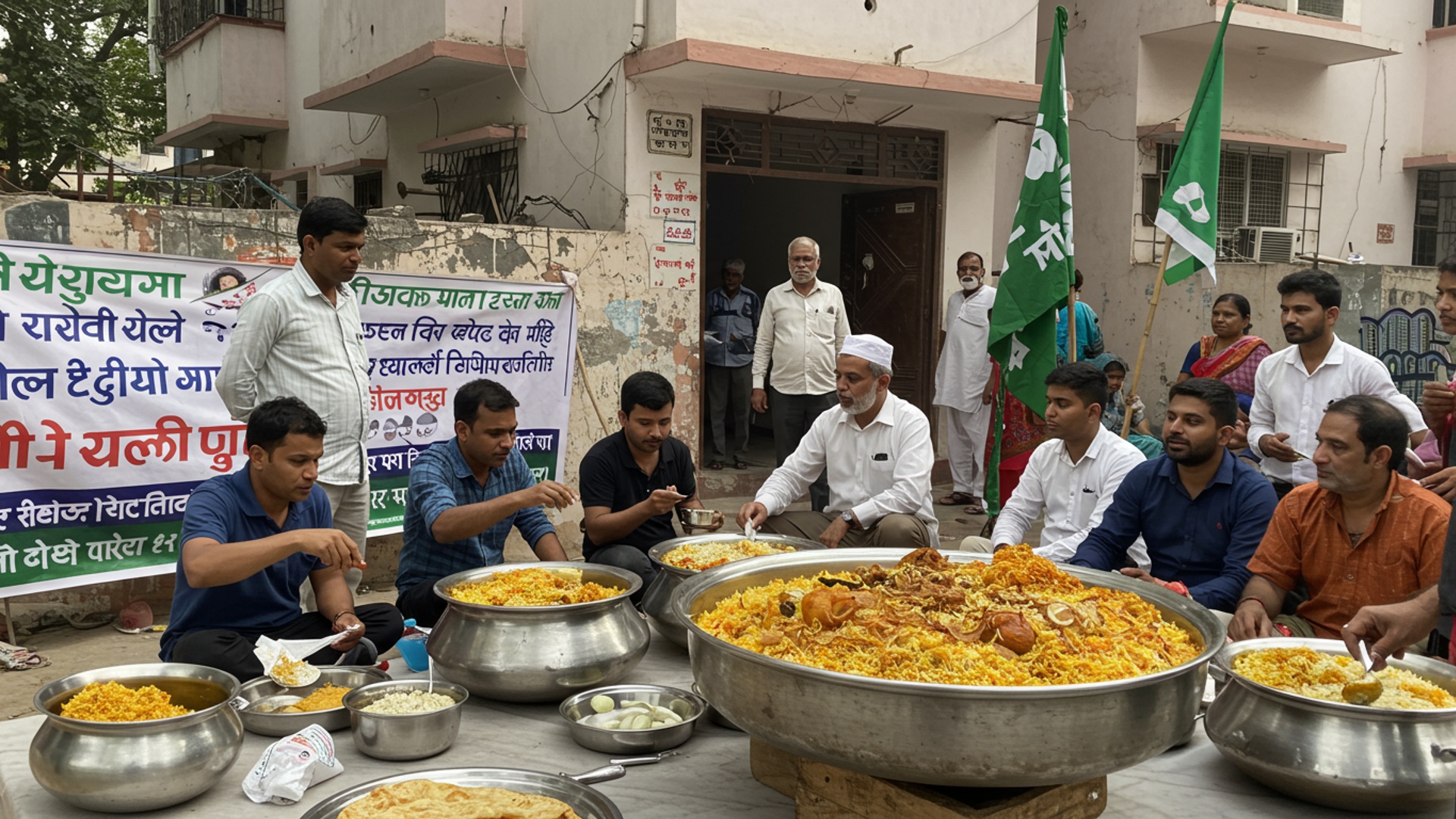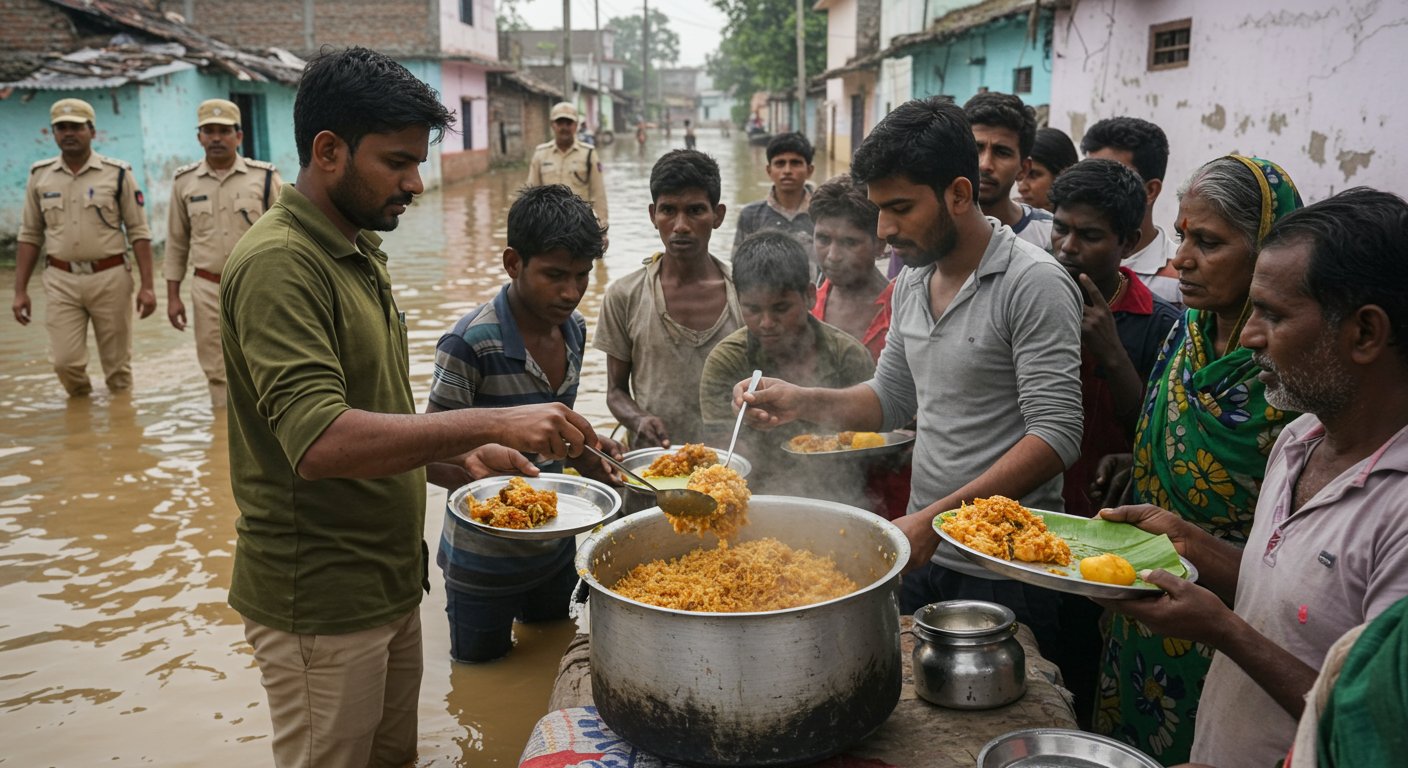A controversial meat ban is sparking widespread outrage, culminating today in a direct challenge by a prominent AIMIM leader. Defying the strict order, he is openly hosting a ‘Biryani Party’ protest, publicly flouting restrictions on meat sales and consumption. This bold move instantly escalates tensions, turning a community’s anger over the ban into a visible act of defiance, forcing a direct confrontation with the new rules.
The Ban Takes Effect
A local government body in Vijaynagar recently issued an order that has caused much discussion and strong reactions among the public. The Vijaynagar Municipal Council announced a temporary halt on the sale and purchase of meat within the city limits. This ban, which began on Tuesday, August 12. is set to continue for a period of eight days, directly affects all meat shops, poultry shops. slaughterhouses in Vijaynagar. The Council stated that the decision was made to show respect for the sentiments of a certain religious community during their ongoing holy festival, known as Samvatser. During this time, many members of the community practice vegetarianism and abstain from meat consumption. The order requires all businesses dealing in meat products to remain closed for the specified duration. This move by the Municipal Council aims to maintain peace and harmony during the religious observances, which are deeply crucial to a large section of the city’s population. But, the immediate effect of this order was felt by many, especially those who depend on the meat business for their daily living.
Leader’s Defiance
Following the announcement of the meat ban, a prominent leader from the All India Majlis-e-Ittehadul Muslimeen (AIMIM) party, Mr. Raza Ali, quickly voiced his strong disagreement. Mr. Ali, a well-known figure in Vijaynagar’s political landscape, stated that the ban was unfair and went against the rights of many citizens. He argued that such orders limit people’s freedom to choose their food and can harm the livelihoods of those involved in the meat trade. Mr. Ali declared that his party would not accept the ban. He called it an attack on personal liberties and economic well-being. To show his protest in a direct way, Mr. Ali announced a plan to hold a public event, which he called a “Biryani Party.” This event was designed to openly defy the municipal order and demonstrate the community’s refusal to comply with what they viewed as an unreasonable restriction. His announcement quickly gained attention across the city, setting the stage for a public showdown over the contentious order.
The Biryani Protest
On Wednesday, August 13, in a direct act of defiance against the Vijaynagar Municipal Council’s meat ban, AIMIM leader Mr. Raza Ali organized a highly visible ‘Biryani Party’ protest. The event took place at a prominent public space near the city center, drawing a significant crowd of supporters and curious onlookers. Large cooking pots, typically used for making biryani, were set up. the aroma of the meat dish filled the air. Participants were openly served and consumed biryani, challenging the ban in full view of the public and media. Mr. Ali himself was seen distributing plates of biryani, emphasizing his stance against the municipal order.
“This ban is an attack on our freedom to eat what we choose,” Mr. Ali stated during the protest. “It also hurts thousands of small business owners and workers who rely on the meat trade. We will not silently accept such arbitrary decisions that impact our lives and livelihoods.”
The protest continued for several hours without major incident, though local police were present to monitor the situation. While there were no immediate arrests or forceful dispersals, the event created a tense atmosphere. Supporters chanted slogans against the ban, expressing their anger and frustration over the restrictions imposed by the municipal body. The ‘Biryani Party’ was clearly designed to be a symbolic act, sending a strong message that the community would not be intimidated by the order. It underscored the deeper issues of personal freedom and economic impact that such bans often raise.
Reasons Behind the Order
The Vijaynagar Municipal Council explained its decision to impose the meat ban by citing the need to respect the religious sentiments of the Jain community during their Samvatser festival. According to official statements from the Council, the ban is a measure to ensure a peaceful and respectful atmosphere during a period when many Jains observe strict vegetarianism and non-violence. The Council highlighted that such bans have been implemented in various cities across the country during similar religious observances in the past. These orders are often seen by authorities as a way to avoid any potential conflicts or disturbances that might arise from different practices during sensitive religious periods. The goal, as stated by the Municipal Council, is to foster communal harmony and allow all citizens to practice their beliefs without interference. The ban covers not just the selling of raw meat but also the operation of slaughterhouses, reflecting a comprehensive approach to the temporary restriction. Council members stated that the decision was made after careful consideration of requests from community leaders and with the overall public good in mind, aiming for a peaceful co-existence of all communities within Vijaynagar.
Different Views Emerge
The meat ban and the subsequent protest by the AIMIM leader have brought out a wide range of opinions from various groups and individuals in Vijaynagar. On one side, several religious and community leaders, primarily from the Jain community, have openly supported the ban. They expressed their gratitude to the Municipal Council for acknowledging their religious practices and providing a respectful environment during their sacred festival. They view the ban as a mark of respect for their beliefs and a step towards communal harmony.
“This temporary ban is a small gesture of respect towards our ancient traditions and a period of deep spiritual significance for us,” said a spokesperson from the Jain community. “It helps create an atmosphere of peace and non-violence which is central to our festival.”
But, the ban has severely affected thousands of meat vendors, butchers. poultry shop owners. These business owners reported significant financial losses due to the sudden closure of their shops for eight days. Many depend on daily sales for their income and expressed deep concern about how they would manage their expenses during this period.
“My family’s livelihood depends entirely on this shop,” explained a local butcher. “Closing for eight days means no income at all. How are we supposed to feed our families? This ban is hurting us badly.”
Other political parties have also weighed in on the issue. Some have sided with the AIMIM, stating that such bans infringe upon the fundamental rights of citizens and are discriminatory. They argue that individual food choices should not be dictated by the state. Conversely, some political factions have supported the Council’s decision, emphasizing the importance of respecting religious sentiments and maintaining social order. The general public remains divided, with some understanding the religious reasons behind the ban, while others prioritize personal freedom and economic impact. The discussions have highlighted the complex balance between religious practices, individual rights. state regulations in a diverse society.
Looking Ahead
The protest organized by the AIMIM leader has added a new layer to the ongoing discussion surrounding the meat ban in Vijaynagar. While the ‘Biryani Party’ concluded peacefully, the underlying tensions persist. It is expected that the Municipal Council will need to address the concerns raised by the AIMIM and the affected business community once the ban period ends. There are talks among legal experts and civil rights groups about the possibility of challenging such bans in court, questioning their legality and whether they align with constitutional guarantees of freedom. Such legal challenges have occurred in other parts of India regarding similar bans. The outcome of this specific situation in Vijaynagar could set a precedent for future policy decisions by local governments. The event has also sparked a wider debate across the city about the role of religious beliefs in public policy and the extent to which individual freedoms can be restricted. As the city moves forward, all eyes will be on how the authorities respond to the public outcry and whether any long-term solutions are sought to balance religious sentiments with the rights and livelihoods of all citizens. The situation remains a key point of discussion among residents, businesses. political groups in Vijaynagar. ![]()










